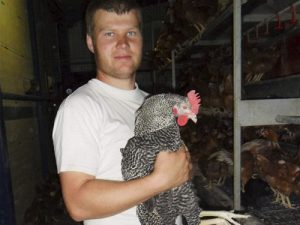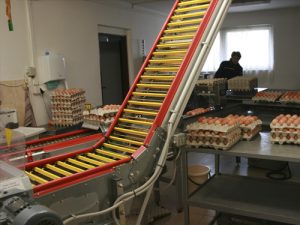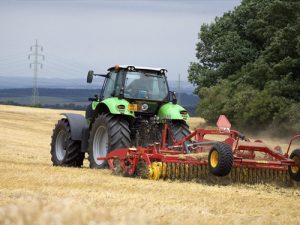This Case Study describes an example of cooperation of five farmers in Central Bohemia region who specialize in egg production. The purpose of the cooperation is to maintain the coverage of demand on all farms in the periods of naturally reduced production.
Area: 1.650 ha
All the farms participating in this type of co-operation range in size from 0 ha to 1 050 ha and each one specializes in egg production; and tillage crops (with the exception of one farm without land) in order to feed the poultry. Two farms have approximately 2 500 hens, whilst the remainder have 6 000 hens. All farmers are selling their produce directly to customers (restaurants, schools, direct sale on farm). None of the farms engage in organic production.
Four of the farmers commenced cooperation activities in 2007in order to provide a more customer orientated and friendly service. At the time the producers had already large stable customer base - not only individual customers buying the eggs directly on farms, but also restaurants and schools which required a significant number of eggs on a daily basis. It can be difficult to create an effective customer-supplier relationship, so the farmers had to ensure that they could provide regular supplies throughout all year even during the period when the hens are laying eggs in lower quantities. In 2016, the fifth farmer became involved in the cooperation activity.
For this type of cooperation, the farmers did not receive any special education or training. The main factor for suc- cess was the ability to reach agreement between all farmers and to ensure similarities in the size of eggs / hen; and , methods and quality of production. The level of communication is very good amongst the farmers. The success of the cooperation is also partly due to the farmers having similar needs and expectations. The cooperation has the same non-financial benefits for everyone.
There was no need for any special training or investment, because no changes were required to the farms or to mar- keting activities. The only thing that was quite difficult at the beginning was time management.
This type of cooperation is quite easy to replicate in other regions or countries, but it is limited to a very specific types of production.
The main challenge was the ability to cooperate with farms who are competing for the same customer base. . An- other very important challenge was time management and coordination of the dates of the flock renewals on the cooperating farms –thereby ensuring sufficient cover to meet the demand for eggs on all “member” farms.
Advice/Recommendation
"One of the most important factors to be considered during setting up this type of cooperation activity is the choice of partners. They have to be very reliable and you need to know them very well to estimate how they will behave while solving complicated challenges that may occur.
In our case it was also important to look for partner farms that have similar characteristics – the number of hens, the size and quality of production and also the characteristics of the customer base."
Queries/Questions
- The important factor in this case was the possibility to find similar partners to estab- lish this type of cooperation activity.
- Are there opportunities in your area to identify farmers/actors who might have similar challenges/opportunities where cooperation might be a solution?
- What challenges exist to consider the option of cooperation with similar farmers/ac- tors vs viewing them as competitors?



 Čeština
Čeština  English
English  Français
Français  Deutsch
Deutsch  Italiano
Italiano  Slovenščina
Slovenščina  Español
Español 



